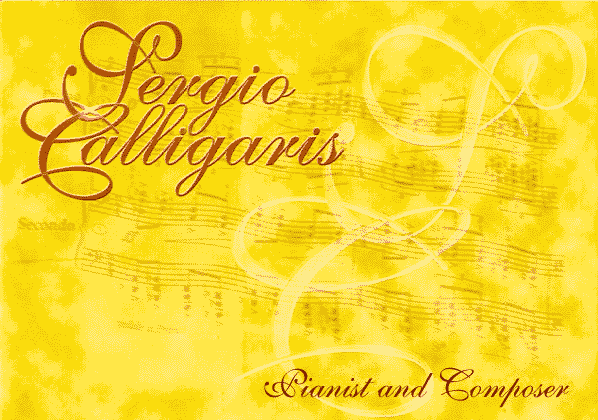 SUONARE news, Year 5th - Nr.42
SUONARE news, Year 5th - Nr.42
(Michelangeli snc - Milano)
July-August 1999 (page 34):
A meeting with Sergio Calligaris,
by Alice Bertolini
Be not eccentric
That's the Argentinian composer and pianist's advice to young people.
"Audience hasn't got to be disorientated with experimentation at all costs".
The success of his Double Concerto for violin, piano and string orchestra,
alternating rhythmic propulsion and lyric passages.
The importance of the emotional aspect of art.
Who's frightened of contemporary music? The days of avant-garde, castled in its ivory
tower, ended from quite a while, and yet wide audience have no doubt whether to choose
between one Mozart's concert or a piece written after 1950. Luckily nowadays we note some
signs of counter-trend. It happened in the Season of Milano Classica, the new orchestra
which received the legacy of Angelicum. The Double Concerto written two years ago
by Sergio Calligaris and published by Carisch, inflamed audience. Also thanks to the
brilliant soloists: violinist Sergej Krilov and pianist Stefania Mormone, to whom the
demanding and seductive composition is dedicated. The Krilov's wild violin tears the
applause even when - like a coup de theatre - in the middle of a incandescent
crescendo, a string breaks. A few minutes to repair the instrument, the music resumes
alternating pages of irresistible rhythmic propulsion to yearning lyrical passages.
Pianist other than composer, Sergio Calligaris, 58 years old, was born in Argentina,
lived for a long time in the United States but has had Italian citizenship for more than
twenty years. He taught in Conservatories of Naples, L'Aquila and Pescara and now he lives
in Rome. To whom asking him to explain the success of his music, he replies: "Being
pianist helps me not to ever lose sight of audience. Contrary to some other colleagues, I
always write thinking to the listener".
Was your Double Concerto written also thinking to definite performers?
Yes, it was. I had heard positive comments on Krilov-Mormone duo. When I finally could
listen to them I was really amazed by their talent and I started straight off writing.
After just three weeks my score was ready and orchestrated.
How did you plan this work?
I thought to a classical structure, in three movements. The first one is a stormy
Toccata like a raging ocean, broken off by a lyrical and melancholy Trio. The Adagio has a
mystical character, with a choral of orchestra. Here violin has to sing like an angel. The
last movement, Allegro con fuoco, is "brutal", nearly wild. As you see, I don't
look for originality at all costs. I don't believe that audience must be disoriented by
force. Certainly, you can't speak of tonal language: I use many altered chords and
polytonal passages. But my counterpointistic writing is rigorous: my models are Bach and
Hindemith.
At the end of Fifties it seemed you had stopped writing, what happened?
I was busy as pianist. But, above all, the extreme avant-garde reigned in Argentina.
The password was to experiment, without any respect for audience. This anxiety of
revolution doesn't belong at all to me. I began composing again almost by chance, with an
occasional piece, "Renzo's Piano Notebook", for pianist Arzeni.
You've been living for more than 20 years in Italy, but listening to your Double
Concerto one feels that South America remained in your heart.
That's it. In my compositions I resume many elements of the argentinian popular
tradition. But that's not all. My South American soul is revealed by the importance I
award to the emotional aspect of art. Nothing more far from Stravinsky: "Music
expresses itself only". Imagine that! Music expresses mood and feeling. That's its
worth.
At piano, what's the repertoire you like to play?
Especially French impressionists, Debussy and Ravel. But I'm also curious. I've even
studied some post-weberian pieces that I've however abandoned quite soon.
What have you been writing now?
I've two errands: one concerto for violin and orchestra for Buenos Aires, with Camillo
Castagno, and a duet for two pianos for the Società dei concerti (Concert Society) of
Milan, with Fabio and Sandro Gemmiti.
Teaching has always had a great role in your activity, but you've recently decided
to retire…
Yes, I'll stop working in Conservatory to devote myself full-time to piano and
composition. But I don't exclude I'll continue leading masterclasses of concert
performing, as I've already been doing in Rome, at the school "Together to do",
where I've some promising pupils. For instance, I think you'll soon hear speaking about
Giampero Belotti.
Why don't you teach composition?
I would never do it. Listen too much to other people's music could distract me. But
I've a suggestion for students of composition: experience taught me that's important the
study of scores of all times great authors and that's no need to be obsessed by ambition
of originality. Just think to Sostakovic: he invented nothing, and yet you recognize his
wonderful music at once.
You went round all over the world, what's your comment on Italian music situation?
I think they speak about it with excessive pessimism. In spite of difficulties, in
Italy important initiatives flourish and talented young people are discovered. But there's
something we could learn by the United States: when I was in Los Angeles, other than the
prestigious Philharmonic conducted by Zubin Mehta, there were more than 20 orchestras,
from the district one to the students and pensioners ones. I remember that my pupils could
practice just playing in these "homely" ensembles. The Italian State should
promote the creation of orchestras also for small seasons. It would be an important step
for the professional growth of young soloists, orchestra players and, why not, composers.
Alice Bertolini

